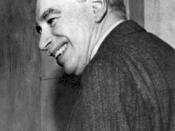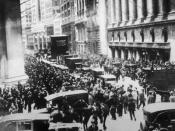The Great Depression is the period of history that followed "Black Thursday", the stock market crash of Thursday, October 24, 1929. The events in the United States triggered a world-wide depression, which led to deflation and a great increase in unemployment. Many economists argue that the Great Depression was both caused and prolonged by government action. The Hoover administration and the Congress increased taxes in a futile attempt to balance the budget. The tax increase only caused a further drop in economic activity, which enlarged the deficit even more. Although the initial trigger event may not have been the result of government action, many have argued that incorrect economic policies turned the stock market crash from a momentary crisis into a decade long depression. In particular two policies have been singled out by economists. The first is the tight money policies of the Federal Reserve which restricted the money supply.
The second was the recourse to protectionism with measures such as the Hawley-Smoot Tariff Act, which raised tariffs on imports in order to protect local producers who were being hurt by foreign competition. In response, many other countries also raised their tariffs, badly hurting US businesses that exported their goods. This led to a chain reaction of tariff increases which fragmented the world economy. In the United States, Herbert Hoover was president, and he tried to do something about the situation without much luck. One of the major problems was that with deflation, the currency that you kept in your pocket could buy more goods as the prices went down. The other was that there had been no oversight in the stock market or other investments, and with the collapse, many of the stock and investment schemes were found to be either insolvent, or outright frauds. Unfortunately, many banks...


